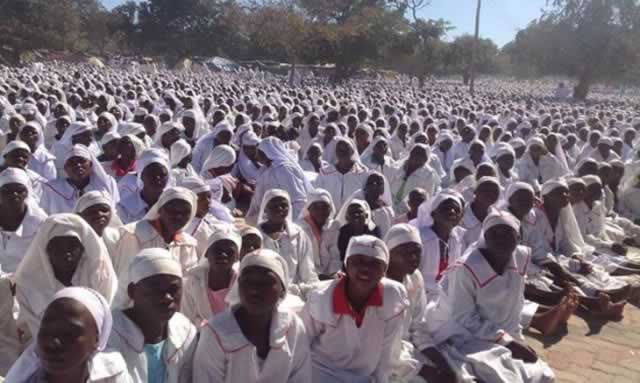Let us end religious norms that encourage child marriages

 Tendayi Gudo: Our Children, Our Future
Tendayi Gudo: Our Children, Our Future
Religious leaders can be a “determining factor” in the growing movement to end child marriages if the right interventions and approaches are used. Some religious traditions are bad, some religious beliefs are harmful while others simply trample on the well-being of others or tacitly condone negative attitudes in the society that put its most vulnerable at risk of exploitation and dehumanisation, particularly the girl child.The Apostolic Women Empowerment Trust (AWET) has already started dialogue with many leaders of the different apostolic sects as another step to end child marriages by fighting religious norms that encourage child marriage.
A lot of education campaigns have been held targeting the apostolic community on the ills of these religious norms that encourage child marriage.
The greater part of the apostolic community is made up of women who are also responsible for the primary socialisation of the child hence engagement with the women as women will yield great results and facilitate for a mind-set shift in the apostolic communities.
“If you educate a man, you educate one person. If you educate a woman, you educate a nation”. It’s an often heard quote in development circles. It is well known that educating boys and girls, men and women, is morally right, but educating girls and women is especially effective because when we educate them, the benefits are acknowledged and felt throughout the whole community.
AWET believes educating the apostolic girls and women is a big step in the right direction to fight the religious norms that encourage child marriages. Women will protect the girl child, raise the boy child to grow up respecting the rights of girls and women and girls will know their rights and be able to stand up for themselves.
In January 2016, the Constitutional Court ruled that the Marriage Act which allowed girls as young as 16 to be married with their parents’ consent was unconstitutional and recognised 18 years as the legal minimum age of marriage. Child marriage is mostly common in indigenous apostolic churches where religious norms encourage child marriage as there is a mixture of Christian beliefs and traditional cultures. This is a group that makes up approximately 38 percent of the total Zimbabwean population, according to research.
Disturbing norms such as the belief that a girl is required to marry between the ages of 12 and 16 years to prevent sexual relations outside marriage are certainly worrying as this is child sexual abuse and violation of the rights of the child who as soon as she reaches puberty, any man in the church can claim her for his wife.
With over 1000 indigenous churches sprouting all over the country, other religious norms such as “virginity testing” where girls as young as 12 years have their private parts inserted fingers by elderly women from the church to check if they are still virgins. This practice degrades the girl child and robs her of her innocence as they get marks on their foreheads if they are virgins and older men in the church get to choose these “fresh” girls to become their wives, most oftenly joining polygamous unions.
Discriminatory religious norms that link a girls’ perceived “purity” to her family’s honour violate the rights of the girl child who is often forced to marry a man who she is not in love with for the sake of her family’s honour.
Some religions will tolerate archaic laws that make paedophilia acceptable, such as that of a child being forced to marry one’s statutory rapist somehow, makes it all better. When these girls refuse, they are often abused. For too long society has allowed some apostolic sects to oppose comprehensive sex education which is often the first step in “predator-proofing” children by teaching them what their private parts are and who is allowed to touch them and what to do if any adult touches them in a bad way and let them know it is safe to tell on adults who do. This is not something that cannot be left up to the parents, many of whom are steeped in misinformation and are often complicit in allowing the abuse, due to financial dependency on the abuser, fear of stigma and horrible advice from certain apostolic sects who often discourage reporting incidents to the police.
The girl child also does not have sex education as it is regarded as taboo to talk about sex which exposes the girl child to abuse as they end up being married off without basic knowledge of reproductive health.
This is a result of religious norms that assume that providing young girls with sex education contributes to promiscuity. Child preference always discriminates the girl child as there still is a religious norm that a girl should only be married. This denies the girl child of good health, education, recreation, economic opportunity and the right to choose a partner violating her rights under articles 2, 6, 12, 19, 24, 27 and 28 of the Convention on the rights of the girl child.
As women, it is important to end religious norms that encourage child marriage as the girl child is violated at all times.
In the census report of 2012, one in every three women aged 20 to 49 years in Zimbabwe was married before their 18th birthday. Around 5 percent of women aged 15 to 49 years were married before their 15th birthday and one in every four girls aged 15 to 19 years in Zimbabwe is married off and most often it is against their will. However, innovative ways including dialogue and awareness raising can be done to change customs.
Culture, customs, and traditions are never static in any society. They are transformed by many influences and value systems. Human rights norms can therefore impact and help to reinforce aspects of culture and tradition that are positive, undermining those that contribute to violence against women and infringement of their human rights such as child marriage. The UNICEF report, From Commitment to Action, says “with their extraordinary moral authority, religious leaders are able to influence thinking, foster dialogue and set priorities for members of their communities. They are frequently in a position to advocate for social and legal change. As those who are often the first to respond to problems, they have the trust and confidence of individuals, families and communities”.
Apostolic communities, because of their huge followers, are uniquely positioned to prevent and respond to the call to end child marriage. There is strong consensus that exists across religious traditions about the dignity of every child and the need to protect children from different forms of violence hence the need for religious leaders to be exemplary. The inherent rights of the child are present in the teachings of many religions. Religious leaders need to be engaged as they play a key role in speaking out against child marriage and changing community attitudes. Religious leaders should be the advocates for change. Laws and policies need to be strengthened. Women should fight the iniquities evils norms to protect their children’s future.
The author is AWET National Coordinator – For comments and contributions, please email:[email protected]










Comments